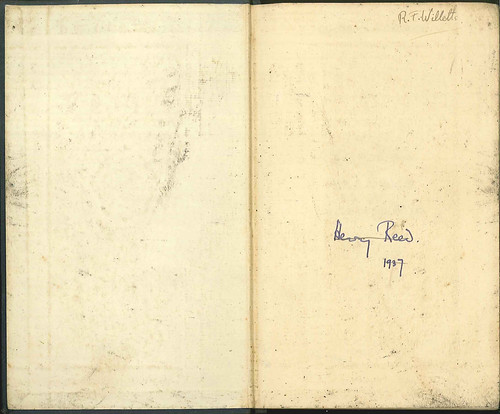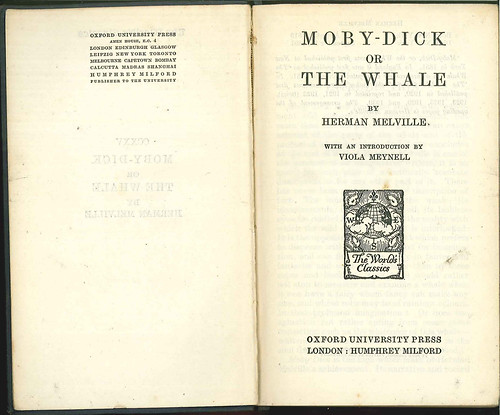A quick search revealed that Ronald Frederick Willetts had been a Professor of Greek at the University of Birmingham. The bookseller was also in Birmingham. It would seem to be the right Reed. I felt, however, that buying this little piece of history would turn me into a Collector, capital "C". Perhaps I should leave the book in Birmingham for someone else? For a month the book languished in my online shopping cart, unpurchased, while I wrestled. In the end, avarice won the day. So here we have it, Henry Reed's personal copy of Moby-Dick:
Disappointingly, besides the two inscriptions, there is no marginalia or other marks. The silk bookmark is threaded between pages 14 and 15, in the first chapter, "Loomings":
Why did the poor poet of Tennessee, upon suddenly receiving two handfuls of silver, deliberate whether to buy him a coat, which he sadly needed, or invest his money in a pedestrian trip to Rockaway Beach? Why is almost every robust healthy boy with a robust healthy soul in him, at some time or other crazy to go to sea?
It seems unlikely—though still entirely possible—that this is the exact copy which Reed referred to when composing his radio adaptation of Moby-Dick for the BBC Third Programme (first broadcast January 26, 1947), much of which was written while Reed was living at Lovell's Farm, in Dorset. How the book came into the hands of Professor Willetts I can't say, but the two men traveled in much the same circles and it certainly seems likely that they would have known each other.
Ronald F. Willetts and Henry Reed were born a year apart—Reed in 1914 and Willetts in 1915. Both men were distinguished scholars and published poets. They attended the University of Birmingham in the 1930s, Reed going up in 1931 and Willetts in 1933; both read Classics under Professor E.R. Dodds, and studied Greek with Louis MacNeice during his tenure there. Reed took an MA in 1936 but was considered precocious; Willetts graduated in 1939. Both taught school before being called up for service during the Second World War. After the war, Reed went on to London to write for the BBC, while Willetts returned to Birmingham where he lectured in Greek until his retirement in 1981. It doesn't seem too far a stretch to believe that this book was a gift or loan.
Reed would seem to have been an admirer of Melville, in general. Besides his radio version of Moby-Dick, we also have him suggesting to Helen Gardner that Redburn may be a possible source for Eliot's "The Dry Salvages." The original working title of Reed's 1954 radio play Emily Butter was "Milly Mudd," and was envisioned as an all-female spoof of Benjamin Britten's operatic version of Billy Budd.









